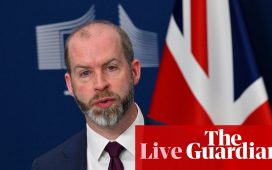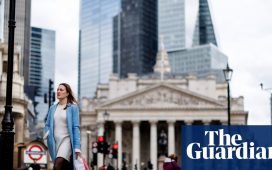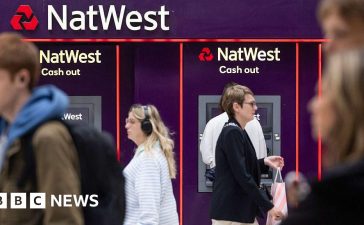Introduction: UK food price inflation driven down by grocers’ price war
Good morning, and welcome to our rolling coverage of business, the financial markets and the world economy.
Food prices in the UK are finally falling, new data this morning shows, thanks to a supermarket price war and easing inflationary pressures.
The British Retail Consortium reports that UK food prices fell by 0.1% during September. That’s the first monthly drop in the cost of food in the shops in over two years.
It brought the annual rate of food price inflation down to 9.9% in September, down from 11.5% in August, and the lowest since August 2022.
Helen Dickinson, OBE, chief executive of the British Retail Consortium, said ”fierce competition between retailers” pulled year-on-year food inflation down to single digits.
Customers who bought dairy, margarine, fish and vegetables – all typically own-brand lines – will have found lower prices compared to last month. Households also benefitted from price cuts for school uniforms and other back-to-school essentials.
Several UK supermarkets have announced rafts of price cuts in recent months, with Tesco squeezing suppliers so it can pass savings on.

More widely, the BRC says prices in British store chains rose at the slowest pace in a year in September, with annual shop price inflation cooling to 6.2% last month from 6.9% in August, its lowest since September 2022.
Annual non-food inflation dropped to 4.4% in September, its lowest since December 2022, and down from August’s 4.7%.
Dickinson predicts shop price inflation to continue to fall over the rest of the year, however there are still many risks to this trend.
They include high interest rates, climbing oil prices, global shortages of sugar, and supply chain disruption from the war in Ukraine.
Food prices have been a key factor pushing up the official UK inflation rate in the last 18 months or so, so the BRC’s figures could indicate the cost of living squeeze is easing.
That will cheer the government, with reports last weekend that Rishi Sunak might call a general election once CPI inflation has dropped below 3%. It was 6.7% in August, having peaked around 11% last year.
Also coming up today
The highly anticipated criminal trial of Sam Bankman-Fried, former CEO of bankrupt crypto exchange FTX, begins today; he faces seven counts of fraud and conspiracy.
The agenda
-
8am BST: Spanish unemployment for September
-
2pm BST: Sam Bankman-Fried’s trial begins in New York
-
3pm BST: JOLTS US job openings data
-
3pm BST: IBD/TIPP index of US economic optimism.
Key events
Pound hits new six-month low
The pound has dropped to its lowest level against the US dollar since mid-March this morning.
Sterling has dipped to $1.2059 this morning, a six and a half-month low.
The slide came as the dollar hit its highest level of 2023 against a basket of currencies. It has been strengthening due to concerns that interest rates will stay high for longer than expected, thanks to the strength of the US economy.
Yesterday, manufacturing data showed that America’s manufacturing sector was close to recovery, while last week’s jobless claims figures remained historically low. That could encourage the US Federal Reserve to raise interest rates on more time this year.
In contrast, the Bank of England may have ended its hiking cycle, after leaving UK interest rates on hold last month.
September was the worst month in a year for the pound, against the US dollar, and October has not started strongly either.
Susannah Streeter, head of money and markets at Hargreaves Lansdown, says:
The dollar’s strength is set to compromise other countries efforts to bring down inflation as their weaker currencies in the face of the greenback’s strength makes imports more expensive.
The pound has been sent reeling again to $1.207, the lowest levels since mid-March.
The collision of a weaker outlook in the UK with the resilience the US economy is showing is weighing heavily on sterling, amid expectations the Federal Reserve will hike interest rates again, while the Bank of England has pressed pause and the path is more uncertain.
Government bond prices also fell yesterday, pushing up the yield (or interest rate) on UK gilts to the highest level since the fallout from Liz Truss’s mini-budget a year ago.
The oil price is weakening this morning, which could take some pressure off inflation.
Brent crude is down 0.5% at $90.25 per barrel. Last week it hit $97.69 per barrel, but has slid back as the dollar has strengthened, and concerns over the global economic outlook have risen.
More good news on inflation: Greggs is not planning to raise prices before Christmas.
Greggs CEO Roisin Currie told Reuters this morning that:
“We don’t have any plans currently to take any further price rises pre-Christmas.”
Greggs has not raised its prices since June, when some products went up by 5p to 10p each, Reuters adds.
Shares in fast fashion retailer Boohoo have hit an eight-year low, after it warned that revenues this financial year could fall much more than forecast.
Boohoo told shareholders that the recovery in its sales volumes has been slower than expected. It now believes revenues this financial year will fall by between 12% and 17%. In May it had predicted a fall of up to 5%.
Boohoo has been hit by falling sales as customers returned to the high street after the pandemic, and by falling demand for leisurewear as workers headed back to the office.
Boohoo says it has cut its average selling prices, year-on-year, while the wider UK clothing market saw price inflation of 8%.
But revenues in the UK are down 19%, reflecting “the impact of the macro environment on consumer demand”, as well as price cuts.
Shares dropped around 10% in early trading to the lowest since August 2015.
Greggs results: What the analysts say
Greggs said it has enjoyed strong trading and inflation is beginning to ease, says Victoria Scholar, head of investment at interactive investor:
The bakery’s offering of drinks and snacks with speedy service have been enjoying strong sales from workers and other people on the go. Despite the cost-of-living crisis with consumers forced to make cutbacks, demand at Greggs remains robust thanks to its competitive pricing and appealing range of hot and cold items like sandwiches, sausage rolls, coffees, and sweet treats.
Even faced with pressures from inflation, Greggs is still expanding with between 135 and 145 net shop openings this year and it is also investing in its supply chain.
Shares in Greggs are up over 40% over the past year. But they have been giving back some gains since the May highs. Nonetheless the analysts remain bullish on the stock with 8 buy recommendations versus 3 holds and zero sells.”
Charlie Huggins, manager of the Quality Shares Portfolio at Wealth Club, says Greggs’ performance so far this year is impressive, and it should return to profit growth in 2024 as cost pressures ease:
“This is another solid performance from Greggs in a challenging economic environment, with little sign so far of consumers cutting back on sausage rolls and pasties.
Greggs has continued to gain market share in a difficult environment which is mightily impressive. There is no doubt Greggs’ brand is resonating strongly with the UK consumer and is in fine fettle.
The cost of raw materials, energy and wages have risen rapidly over the last year, but encouragingly these cost pressures are now beginning to ease. This isn’t just good news for profit margins but should also help underpin consumer demand by reducing the need for price increases.
Matt Britzman, equity analyst at Hargreaves Lansdown says the baker chain “continues to delight”.
Greggs is starting to build quite the reputation for delivering strong results, and today’s update certainly hasn’t bucked that trend. Once heralded for its sausage rolls, Greggs has worked hard to expand the menu whilst retaining its core value offering. All the while, the expanding delivery service (like the new partnership with Uber Eats), click & collect options, and later opening times make it easier than ever to get your bakery fix.
Inflated costs are starting to ease, which gives more wiggle room on pricing over the second half. Don’t be surprised to see a slight cooling effect on like-for-like sales from here, as it laps periods last year when prices moved higher. It’s a win in the long run though, less pressure on costs makes it easier to keep prices in check and retain that coveted value offering.
Bears will argue the valuation doesn’t leave a whole lot of room for error, and they’d be right. But with great food comes with even greater expectations and Gregg’s broadening shoulders look strong enough to carry that weight.”
Greggs customers will be keen to know that its autumn menu is now available.
It includes a hot spicy chicken and veg bhaji baguette, while new vegetarian options include a cheese and honey mustard toastie, veg bhaji flatbread and mozzarella and cheddar bites.
on the drinks side, there’s a new hazelnut mocha and hazelnut hot chocolate, while the pumpkin spice latte is back on the menu too.
Greggs lates quarterly results also shows that it continued to expand across the UK.
It opened 144 new stores so far this year, and closed 62, leading to a net increase of 82 stores.
It expects between 135 and 145 net shop openings in 2023 and around 40 relocations.
Greggs: Some easing in cost inflation in latest results

British baker and fast food chain Greggs has confirmed that cost pressures are easing.
In its latest quarterly results, just released to the City, Greggs says there has been “some easing in cost inflation” in the last three months.
The company explains that it is now around a year since the “significant commodity-led increases” of 2022 for energy and food ingredients, which means annual inflation rates are now slowing.
It adds:
At a time when customers are looking to make their money go further Greggs continues to offer exceptional value and grow market share.
We have strong product and promotional plans for the fourth quarter and the extension of our delivery service will make Greggs accessible to more customers on more occasions.
Greggs reported that like-for-like sales in company-managed shops have risen by 14.2% in the 13 weeks to 30 September.
It is sticking with its guidance for the financial year, despite “the uncertainty in the economy as a whole”.
Introduction: UK food price inflation driven down by grocers’ price war
Good morning, and welcome to our rolling coverage of business, the financial markets and the world economy.
Food prices in the UK are finally falling, new data this morning shows, thanks to a supermarket price war and easing inflationary pressures.
The British Retail Consortium reports that UK food prices fell by 0.1% during September. That’s the first monthly drop in the cost of food in the shops in over two years.
It brought the annual rate of food price inflation down to 9.9% in September, down from 11.5% in August, and the lowest since August 2022.
Helen Dickinson, OBE, chief executive of the British Retail Consortium, said ”fierce competition between retailers” pulled year-on-year food inflation down to single digits.
Customers who bought dairy, margarine, fish and vegetables – all typically own-brand lines – will have found lower prices compared to last month. Households also benefitted from price cuts for school uniforms and other back-to-school essentials.
Several UK supermarkets have announced rafts of price cuts in recent months, with Tesco squeezing suppliers so it can pass savings on.

More widely, the BRC says prices in British store chains rose at the slowest pace in a year in September, with annual shop price inflation cooling to 6.2% last month from 6.9% in August, its lowest since September 2022.
Annual non-food inflation dropped to 4.4% in September, its lowest since December 2022, and down from August’s 4.7%.
Dickinson predicts shop price inflation to continue to fall over the rest of the year, however there are still many risks to this trend.
They include high interest rates, climbing oil prices, global shortages of sugar, and supply chain disruption from the war in Ukraine.
Food prices have been a key factor pushing up the official UK inflation rate in the last 18 months or so, so the BRC’s figures could indicate the cost of living squeeze is easing.
That will cheer the government, with reports last weekend that Rishi Sunak might call a general election once CPI inflation has dropped below 3%. It was 6.7% in August, having peaked around 11% last year.
Also coming up today
The highly anticipated criminal trial of Sam Bankman-Fried, former CEO of bankrupt crypto exchange FTX, begins today; he faces seven counts of fraud and conspiracy.
The agenda
-
8am BST: Spanish unemployment for September
-
2pm BST: Sam Bankman-Fried’s trial begins in New York
-
3pm BST: JOLTS US job openings data
-
3pm BST: IBD/TIPP index of US economic optimism.







